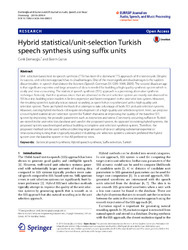Hybrid statistical/unit-selection Turkish speech synthesis using suffix units
| dc.contributor.author | Demiroğlu, Cenk | |
| dc.contributor.author | Güner, Ekrem | |
| dc.date.accessioned | 2016-06-29T13:04:24Z | |
| dc.date.available | 2016-06-29T13:04:24Z | |
| dc.date.issued | 2016-12 | |
| dc.identifier.issn | 1687-4722 | |
| dc.identifier.uri | http://hdl.handle.net/10679/4061 | |
| dc.identifier.uri | http://link.springer.com/article/10.1186/s13636-016-0082-0 | |
| dc.description | Due to copyright restrictions, the access to the full text of this article is only available via subscription. | |
| dc.description.abstract | Unit selection based text-to-speech synthesis (TTS) has been the dominant TTS approach of the last decade. Despite its success, unit selection approach has its disadvantages. One of the most significant disadvantages is the sudden discontinuities in speech that distract the listeners (Speech Commun 51:1039-1064, 2009). The second disadvantage is that significant expertise and large amounts of data is needed for building a high-quality synthesis system which is costly and time-consuming. The statistical speech synthesis (SSS) approach is a promising alternative synthesis technique. Not only that the spurious errors that are observed in the unit selection system are mostly not observed in SSS but also building voice models is far less expensive and faster compared to the unit selection system. However, the resulting speech is typically not as natural-sounding as speech that is synthesized with a high-quality unit selection system. There are hybrid methods that attempt to take advantage of both SSS and unit selection systems. However, existing hybrid methods still require development of a high-quality unit selection system. Here, we propose a novel hybrid statistical/unit selection system for Turkish that aims at improving the quality of the baseline SSS system by improving the prosodic parameters such as intonation and stress. Commonly occurring suffixes in Turkish are stored in the unit selection database and used in the proposed system. As opposed to existing hybrid systems, the proposed system was developed without building a complete unit selection synthesis system. Therefore, the proposed method can be used without collecting large amounts of data or utilizing substantial expertise or time-consuming tuning that is typically required in building unit selection systems. Listeners preferred the hybrid system over the baseline system in the AB preference tests. | |
| dc.description.sponsorship | TÜBİTAK | |
| dc.language.iso | eng | en_US |
| dc.publisher | Springer International Publishing | |
| dc.relation | info:turkey/grantAgreement/TUBITAK/109E281 | |
| dc.relation.ispartof | EURASIP Journal on Audio, Speech, and Music Processing | |
| dc.rights | openAccess | |
| dc.rights | Attribution 4.0 International | |
| dc.rights.uri | https://creativecommons.org/licenses/by/4.0/ | |
| dc.title | Hybrid statistical/unit-selection Turkish speech synthesis using suffix units | en_US |
| dc.type | Article | en_US |
| dc.peerreviewed | yes | |
| dc.publicationstatus | published | en_US |
| dc.contributor.department | Özyeğin University | |
| dc.contributor.authorID | (ORCID 0000-0002-6160-3169 & YÖK ID 144947) Demiroğlu, Cenk | |
| dc.contributor.ozuauthor | Demiroğlu, Cenk | |
| dc.identifier.volume | 4 | |
| dc.identifier.wos | WOS:000369270000001 | |
| dc.identifier.doi | 10.1186/s13636-016-0082-0 | |
| dc.subject.keywords | Statistical speech synthesis | |
| dc.subject.keywords | Hybrid speech synthesis | |
| dc.subject.keywords | Suffix selection | |
| dc.subject.keywords | Turkish | |
| dc.identifier.scopus | SCOPUS:2-s2.0-84957801509 | |
| dc.contributor.ozugradstudent | Güner, Ekrem | |
| dc.contributor.authorMale | 2 |
Files in this item
This item appears in the following Collection(s)
Share this page




